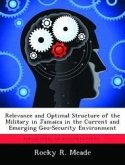A systems perspective is beginning to permeate doctrine. This perspective calls for an analysis of the key systems of an adversary. PMESII is an acronym that stands for political, military, economic, social, infrastructure, and information systems. Analyzing the adversary's PMESII systems can lead to the identification of key nodes, links, and vulnerabilities, which can then be targeted kinetically or non-kinetically to achieve desired effects. The PMESII systems construct applies well when the adversary is a state. All of these systems will be present, and mature, with many of them possessing tangible infrastructure, which can easily be identified by Intelligence, Surveillance, and Reconnaissance, and then targeted with precision weaponry. However, when the adversary is non-state actor, these same systems will be noticeably missing. Non-state actors are organized fundamentally different than states, and manifest themselves in completely different ways. The utility of the PMESII construct is significantly diminished when the adversary is a non-state actor. To apply the systems perspective to non-state actors, such as Al-Zarqawi, the Al Qaeda leader in Iraq, a different construct is required. The author maintains that identifying the critical requirements of non-state actors leads to a more relevant construct. The author, using the nonstate actor Zarqawi, identifies four systems that the typical non-state actor requires to remain viable. These systems are funding, recruitment, information and support, or (FRIS). The FRIS construct provides the same level of utility for the non-state actor, as PMESII does for states. The author recommends incorporating the FRIS construct as a corollary to the PMESII construct in the doctrinal manuals and publications that discuss the systems perspective.
Bitte wählen Sie Ihr Anliegen aus.
Rechnungen
Retourenschein anfordern
Bestellstatus
Storno









